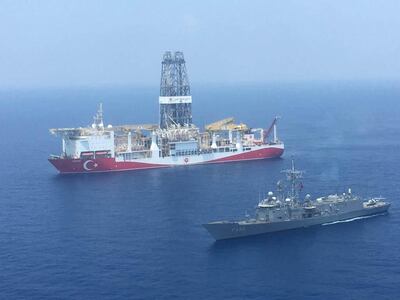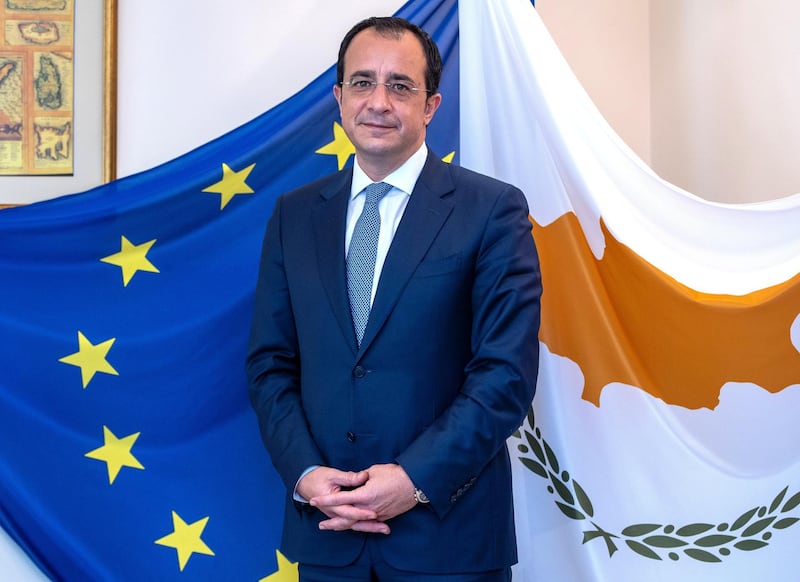Close co-operation on the Mediterranean is needed to tackle common threats, with quiet mediation preferable to gunboat diplomacy, Cypriot Foreign Minister Nikos said on a visit to Abu Dhabi this week.
But, he added, Turkey must respect Cyprus’s territorial integrity in disputed waters.
“This is a prerequisite for any kind of co-operation with Turkey. But we believe that only diplomacy and negotiations can solve our problems. We can’t change geography,” he said.
Speaking in an exclusive interview with The National, Mr Christodoulides pointed to deepening ties between Cyprus and its Middle East neighbours to tackle security threats in the region.
“The geopolitical realities are bringing Cyprus and the United Arab Emirates together to face common concerns and challenges with a positive agenda. We signed our first military co-operation agreement recently [on January 12] to bolster relations with nearby countries in the Middle East,” Mr Christodoulides said.
Tensions flared when Turkey last year sent research ships to explore for gas riches west of Cyprus. Greece condemned the move as destabilising. France sided with Greece and despatched two warships as a sign of solidarity.
Cyprus already had military agreements with Egypt, Israel and Jordan to hold joint military training exercises. But the EU nation is expanding its relations in the region and also signed a military pact last May to help train Lebanon's army.
The new agreement with the UAE comes after the Emirates participated in a large-scale sea and air military exercise off Egypt in November 2020. French, Greek, Egyptian and Cypriot personnel were also involved in the exercise, named Medusa.
“We are all like-minded countries … Cyprus, UAE, Egypt, Greece, Israel, Jordan and some European countries like France, are all working together for positive agenda for the region,” said Mr Christodoulides, who met with Sheikh Abdullah bin Zayed, UAE Minister of Foreign Affairs and International Co-operation, on Monday.
The Cypriot minister told The National that the UAE is a "pillar of stability" in a region that has great potential, voicing his country's support of the UAE's observer status in the Cairo-based East Mediterranean Gas Forum (EMGF).
Read More
[ Turkey and Greece to resume talks over disputed waters ]
[ EU ready to support Greece in talks with Turkey over eastern Mediterranean ]
Egypt, Israel, the Palestinian Authority, Greece, Cyprus, Italy and Jordan established the EMGF in September as an intergovernmental organisation, in a virtual ceremony hosted by Cairo. Turkey was excluded.
In recent months, many old status quos in the Middle East have been overturned and now with the clock ticking down to Joe Biden’s inauguration as US president, a host of regional countries have begun readjusting their foreign policies.
The UAE and Bahrain signed an agreement last year with Israel to establish diplomatic ties, known as the Abraham Accords. And this month Saudi Arabia, the UAE, Bahrain and Egypt agreed to fully restore ties with Qatar at a Gulf Cooperation Council summit in the city of Al Ula, in north-western Saudi Arabia.
So could Cyprus readjust its foreign policy with its nearest neighbour, Turkey and Turkish President Recep Tayyip Erdogan?
“Frankly speaking, we have a serious problem with Turkey. It’s an existential issue and security is a great concern for Cyprus. We just want Mr Erdogan to respect international law and our territorial integrity,” Mr Christodoulides said.
Cyprus, which is home to both Greeks and Turks, was divided along ethnic lines in 1974 when Turkey invaded after a coup aimed at union with Greece. Only Turkey recognises a breakaway Turkish Cypriot state in the island's northern third.
Cyprus, including the north, joined the EU in 2004, but EU laws and membership benefits only apply to the Greek Cypriot south where the internationally recognised government is seated.

In the interview, Mr Christodoulides welcomed last month's vote by the EU to expand sanctions against Turkey for its exploration of energy sources in a disputed Mediterranean area, calling it a "very important step that sends a clear message to Mr Erdogan and his Ottoman ambitions in the region to respect the sovereignty of other countries".
The EU has repeatedly condemned Turkey’s exploration off Cyprus, saying it breaches the sovereign rights of a member nation.
But the Cypriot diplomat signalled his country's support of the recent signs of rapprochement between Turkey and Greece to resume next week long-suspended talks over territorial claims in the Mediterranean Sea. These claims brought the two Nato members close to conflict last year.

Their dispute threatened to become open conflict when Turkish and Greek warships collided in August as they shadowed the Turkish seismic exploration vessel Oruc Reis while it surveyed for oil and gas.
Mr Christodoulides acknowledged that Cyprus’s so-called golden passport scheme had been problematic.
The 2013 scheme, scrapped in November last year, offered passports in exchange for investment with hundreds of people gaining citizenship through the programme.
Media reports said that foreign criminals found loopholes in the application process
and obtained EU passports.
“There will be no more such programmes for our citizenship,” Mr Christodoulides said.






